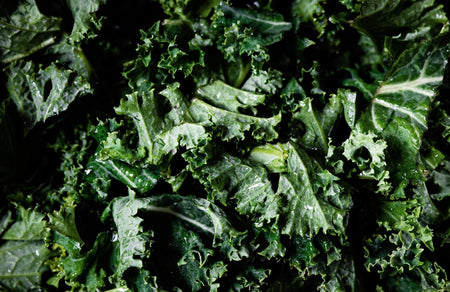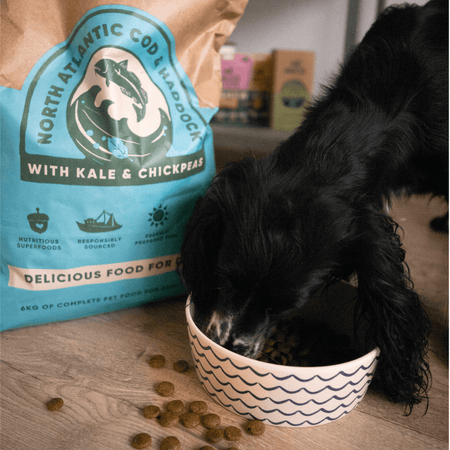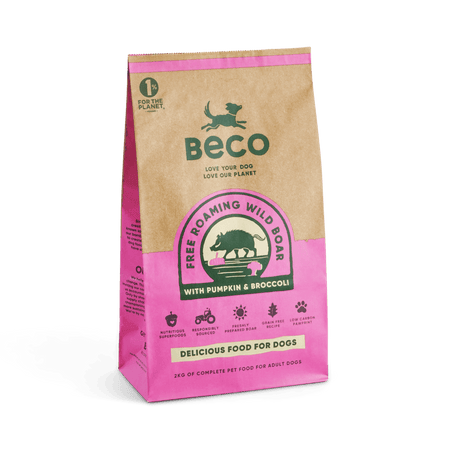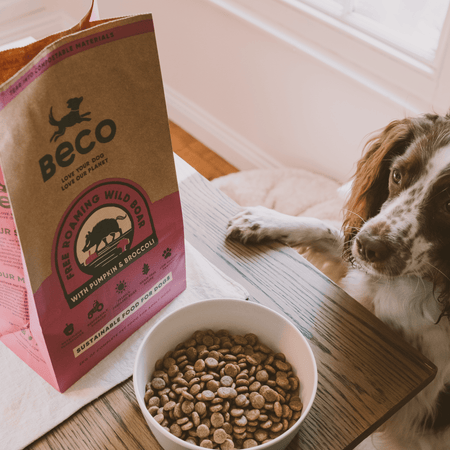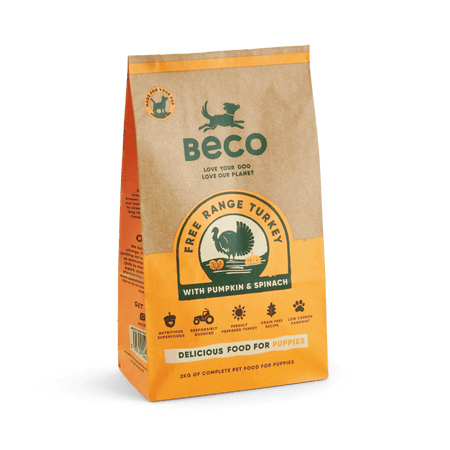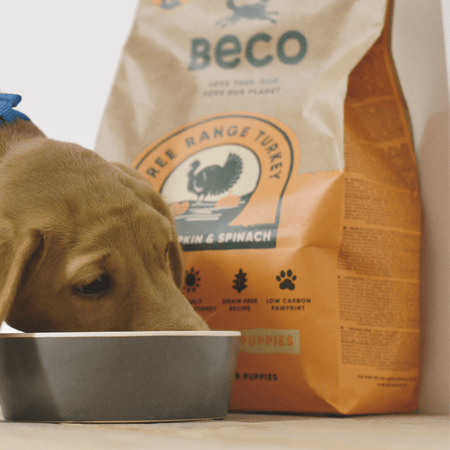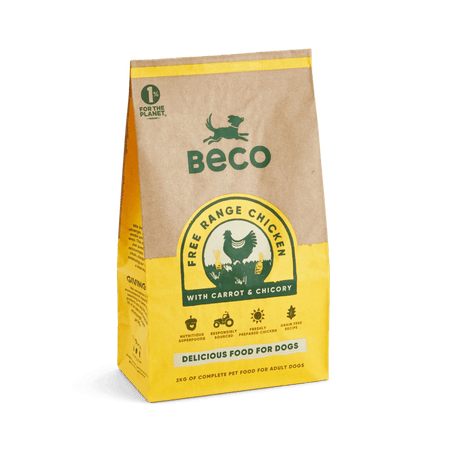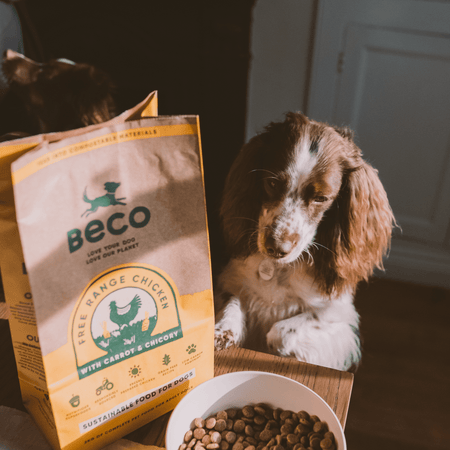In recent years, kale has gone from a little-known leafy vegetable to a must-have superfood.
And it’s easy to see why given the reported health benefits of kale for humans range from improved bone density to cancer prevention.
After learning the numerous health benefits of kale, many pet parents want to feed their dog this vegetable. Before doing so, however, they’ll need to know if kale offers the same benefits when eaten by dogs and puppies. Even more importantly, they’ll be wondering If kale is safe for their dog to eat?

It’s good news for people wanting to feed their dogs kale because kale is good for dogs in moderation. When it makes up a small percentage of a recipe, such as with a kibble diet, you can give your dog the nutritional benefits of this vegetable without doing them harm.
However, there are some exceptions to the “kale is good for dogs” rule. Overfeeding your dog anything can pose health risks, even something as healthy as kale. So if you’re thinking of adding kale into your dog’s diet, be mindful of breed and portion size and talk to your vet if you have concerns.
It’s also important to remember that all dogs are different. For example, while kale is not toxic to dogs, some dogs will simply not like how it tastes (you’ll know this is the case if they refuse to eat it or spit it out). Others may enjoy it but struggle to digest more than a very small amount in their food.
If your dog suffers with specific medical issues or conditions, such as thyroid issues, your vet may advise against feeding them kale altogether.
What is kale?
Let’s get back to basics. Kale is a green, leafy vegetable from the cruciferous family of vegetables, a family which includes broccoli, cauliflower, and cabbage. Kale is packed full of vital nutrients, antioxidants, and fibre.
Raw kale contains vital vitamins and minerals. These include:
Vitamin A
Vitamin K
Vitamin C
Vitamin B6
Manganese
Calcium
Copper
Potassium
Magnesium
Iron and phosphorus
Health benefits
1. Acts as an anti-inflammatory
The antioxidants and high levels of vitamin C in kale make it a great anti-inflammatory and immune system booster for dogs.
2. Reduces the risk of cancer
The antioxidants in kale are believed to help fight against free radicals in the body and protect against cancer. This benefits humans and dogs, as both are regularly exposed to free radical-causing things like pollution and pesticides.
3. Boosts digestion and gut health
Kale is a high fibre and low-calorie vegetable making it a great choice for improving your dog’s gut health and digestion, which should keep their poop healthy and normal. As part of a well-balanced diet, fibrous veggies like kale can also help keep your pup at a healthy weight.
4. Maintains healthy blood function
Kale provides high amounts of vitamin K, which aids with blood clotting.
5. Improves eye health
Beta-carotene is what gives vegetables like carrots their orange colour. In kale, however, this orange pigment is covered up by chlorophyll. Beta-carotene, which the liver converts to Vitamin A, aids in maintaining and improving eye health. In dogs, this helps to protect their retina against oxidative damage.
6. Keeps muscles and bones strong
This superfood contains high amounts of calcium and vitamin K, both of which contribute to strong bones and muscles in dogs. Too much calcium is dangerous for dogs, however, and can lead to kidney problems.
Just as with whole grains, such as brown rice and oats, kale can be really beneficial for your dogs, provided it is given to them in moderation and part of a carefully balanced, wholesome diet.
However, as we’ve already hinted, this fibrous, cruciferous vegetable can also be problematic for some dogs.
So, is kale bad for dogs? Only in certain circumstances and we’ve detailed these below.
Kidney and bladder stones
Kale contains high levels of calcium oxalate. Dogs who have a history of kidney or bladder stones should avoid these foods as they aid in the formation of kidney and bladder stones.
Thankfully, most pets do recover from kidney or bladder stones, but they may require time in hospital and medication to do so. When it comes to pet health, it’s always a good idea to play it safe.
Cooking kale significantly reduces calcium oxalates. However, it’s still best to consult with your vet before feeding kale to a dog with the above conditions.
Gastric irritation
Isothiocyanate, a naturally occurring molecules in vegetables like kale and broccoli, pose a potential problem to dogs. Although they have been shown to reduce cancer risk in humans, they can cause mild to severe gastric irritation – including gas, stomach aches, or diarrhea – in dogs.
Given the risks associated with Isothiocyanate's, how much kale is safe for my dog? Experts advise that broccoli and kale are safe to consume provided the total amount ingested is less than 10 percent of their daily intake. Over 25 percent may be toxic to them.
Digestive issues
Aside from the presence of isothiocyanate, kale can also cause stomach problems in dogs (such as foul-smelling wind) because of its high-fibre content. While its fibrous quality is what makes it so beneficial for gut health, too much of it can also make it tough for dogs to digest.
The easiest ways to reduce the symptoms caused by an excess of fibre is to make sure the kale is properly cooked before feeding it to them. While dogs can eat kale cooked and raw, cooked kale is much easier for them to digest.
When it comes to switching things up and adding more fibre to your dog’s diet, it’s a good idea to avoid making any sudden changes – unless, of course, they suffer with a food allergy or intolerance. To avoid any digestive distress, its best to add fibrous veggies, such as kale, into their meals over a period of a few weeks.
Watch out for dogs with particularly sensitive stomachs – they may not be able to tolerate much – if any – kale.
Don’t want to take the risk? Then why not go for our healthy dog food that contains the perfect amount of kale. It’s hypo-allergenic and grain-free making it very easy to digest – plus, it’s also packed full of nutrient-rich vegetables, such as kale.
Thyroid problems
Consumed in large amounts, kale can also negatively affect thyroid function in dogs. That’s because it interferes with how their thyroid uses iodine and iodine plays a role in hormone production in the thyroid gland.
If your dog has pre-existing thyroid issues, you vet may recommend keeping kale as well as other cruciferous veggies to a minimum or avoid them altogether.
For dogs with these conditions that are allowed to eat this superfood, they should avoid eating kale in its raw state.
Final thoughts
By now you’ll (hopefully) know that kale is neither toxic or poisonous to dogs.
Instead, kale can be safely eaten by dogs and there are many health benefits of including a small to moderate amount in their diet.
However, as we’ve also made clear, dogs are unique and not all of them do well on kale. Whether this cruciferous veggie suits your dog is dependent on things like their breed and size, any underlying health conditions, and the strength of their digestive system.
Kale should be okay for dogs, provided you stick to the right amount for the size and breed. However, if after eating kale you spot your dog suffering with signs of bladder stones, such as vomiting, diarrhea, a sudden change in toilet habits or difficulty urinating, call the vet immediately.
If you suspect your dog may be suffering adverse reactions to their diet, contact your vet for advice as soon as possible.
